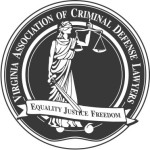Experienced Virginia Criminal Lawyer Defense Attorneys
 Riley & Wells Attorneys-At-Law understands that facing the criminal justice system after being accused of committing a criminal offense is a frightening experience. Our top rated Virginia criminal lawyers work directly with each client at every stage of the case, from arrest to verdict. In some instances, we can begin the representation during the law enforcement investigative phase. We have developed creative solutions and the skill to deliver highly personalized service for each client after specializing in criminal law for over 60 collective years. Our Virginia criinal lawyers are recognized as a “Best Law Firm” by U.S. News & World Report for superior legal ability and ethical standards in the field of criminal defense.
Riley & Wells Attorneys-At-Law understands that facing the criminal justice system after being accused of committing a criminal offense is a frightening experience. Our top rated Virginia criminal lawyers work directly with each client at every stage of the case, from arrest to verdict. In some instances, we can begin the representation during the law enforcement investigative phase. We have developed creative solutions and the skill to deliver highly personalized service for each client after specializing in criminal law for over 60 collective years. Our Virginia criinal lawyers are recognized as a “Best Law Firm” by U.S. News & World Report for superior legal ability and ethical standards in the field of criminal defense.
***Our attorneys are licensed to practice law in all Virginia Courts***
Recognized as a “Best Law Firm” for Virginia Criminal Law
 Our Virginia criminal lawyers have a proven track record of using trial skills and negotiation skills along with a detailed familiarity with the criminal justice system to develop an effective defense strategy. Our attorneys know how to effectively defend a criminal case and are not afraid to challenge the evidence in tough cases. We fight for our clients using every legal resource to achieve the possible outcome.
Our Virginia criminal lawyers have a proven track record of using trial skills and negotiation skills along with a detailed familiarity with the criminal justice system to develop an effective defense strategy. Our attorneys know how to effectively defend a criminal case and are not afraid to challenge the evidence in tough cases. We fight for our clients using every legal resource to achieve the possible outcome.
Top Rated Virginia Criminal Lawyer Defense Trial Attorneys
Riley & Wells Attorneys-At-Law Defend Virginia Criminal Cases
- Federal Offenses
- Murder
- Arson
- Robbery
- Rape
- Felon in Possession of a Firearm
- Burglary
- Refusal
- Alcohol Possession
- Reckless Handling of a Firearm
- Failure To Appear/Capias
- Expungements
- Possession of Cocaine
- Credit Card Fraud
- Extortion
- VASAP Violations
- Credit Card Offenses
- Computer Trespass
- Gun Right Restorations
- Malicious Wounding
- Maiming
- Firearm Offenses
- Embezzlement
- Computer Fraud
- Asset Forfeiture
- Abduction
- Suspended/Revoked Driver’s License
- Shoplifting
- Stalking
- Carjacking
- Protective Orders/Violations
- Credit Card Offenses
- Discharging a gun in public
- Bad Checks
- Sex Offenses
- Prostitution
- Brandishing a Firearm
- Solicitation
- Money Laundering
- Probation Violations
- Obstruction
- Trespassing
- Uttering
- DUI / DWI
- Grand Larceny
- Petit Larceny
- Firearm in Airport Terminal
- Receiving Stolen Goods
- Sexual Battery
- Eluding
- Drunk in Public
- Assault & Battery
- Fraud
- Drug Distribution
- Expungement
- Domestic Violence
- Hit and Run
- Identity Theft
- Mail Fraud
- Identity Fraud
- Concealed Weapon/Handgun
- Unlawful Wounding
- Disorderly Conduct
- Conspiracy
- Manslaughter
- Reckless Driving
- Forgery
- Computer Offenses
- Marijuana Possession
- False Statement on Firearm Form/Criminal History Consent Form (attempt to purchase/possess offenses)
Federal Criminal Defense Attorney – Eastern District of Virginia
 The U.S. District Court for the Eastern District of Virginia is commonly known as the Rocket Docket. Our federal criminal defense lawyers regularly defend federal criminal cases in the Eastern District of Virginia’s Richmond Division. The federal criminal code is VERY complex. You need a professional with experience if you are facing federal criminal charges. We can help!
The U.S. District Court for the Eastern District of Virginia is commonly known as the Rocket Docket. Our federal criminal defense lawyers regularly defend federal criminal cases in the Eastern District of Virginia’s Richmond Division. The federal criminal code is VERY complex. You need a professional with experience if you are facing federal criminal charges. We can help!
Virginia Criminal Defense Attorneys Recognized by Super Lawyers
 Super Lawyers is a legal rating service comprised of outstanding lawyers from over 70 practice areas including criminal defense who have attained a high-degree of peer recognition and professional achievement. This organization recognizes the top rated lawyers nationwide across a variety of practice areas and firm sizes using a patented process of independent research and peer input. Our Virginia criminal lawyers have been recognized by this publication since 2009. No more than five percent of the Virginia lawyers are named to this list and no more than 2.5 percent are named to the Rising Stars list. This recognition is merit based. Retain a Virginia criminal defense lawyer who has been recognized with this elite award.
Super Lawyers is a legal rating service comprised of outstanding lawyers from over 70 practice areas including criminal defense who have attained a high-degree of peer recognition and professional achievement. This organization recognizes the top rated lawyers nationwide across a variety of practice areas and firm sizes using a patented process of independent research and peer input. Our Virginia criminal lawyers have been recognized by this publication since 2009. No more than five percent of the Virginia lawyers are named to this list and no more than 2.5 percent are named to the Rising Stars list. This recognition is merit based. Retain a Virginia criminal defense lawyer who has been recognized with this elite award.
Effective Virginia Criminal Defense Lawyers
 The U.S. Constitution requires the prosecution to prove every element of a criminal offense beyond a reasonable doubt before the accused can be convicted or found guilty of the allegation. Reasonable doubt is required in criminal proceedings under the due process clause of the Fifth Amendment to the U.S. Constitution. If there is a reasonable doubt then the defendant is to be found NOT GUILTY!
The U.S. Constitution requires the prosecution to prove every element of a criminal offense beyond a reasonable doubt before the accused can be convicted or found guilty of the allegation. Reasonable doubt is required in criminal proceedings under the due process clause of the Fifth Amendment to the U.S. Constitution. If there is a reasonable doubt then the defendant is to be found NOT GUILTY!
Fifth Amendment of the U.S. Constitution
No person shall be held to answer for a capital, or otherwise infamous crime, unless on a presentment or indictment of a Grand Jury, except in cases arising in the land or naval forces, or in the Militia, when in actual service in time of War or public danger; nor shall any person be subject for the same offence to be twice put in jeopardy of life or limb; nor shall be compelled in any criminal case to be a witness against himself, nor be deprived of life, liberty, or property, without due process of law; nor shall private property be taken for public use, without just compensation.
"Reasonable Doubt" Standard of Proof
A cornerstone of American criminal jurisprudence is that the accused is presumed innocent until his guilt is proved beyond a reasonable doubt. The standard of proof in criminal cases is “beyond a reasonable doubt”. This means that the prosecution must convince the judge or jury hearing the case that the defendant is guilty beyond any reasonable doubt based on the evidence presented.
Beyond a reasonable doubt is the legal burden of proof required to affirm a conviction in a criminal case. In a criminal case, the prosecution bears the burden of proving that the defendant is guilty beyond all reasonable doubt. This means that the prosecution must convince the judge or jury hearing the case that there is no other reasonable explanation that can come from the evidence presented at trial. In other words, the judge or jury hearing the case must be virtually certain of the defendant’s guilt in order to render a guilty verdict. This standard of proof is much higher than the civil standard, called “preponderance of the evidence,” which only requires a certainty greater than 50 percent.
Zealous Criminal Law Representation
 We are serious about protecting our clients. The United States Constitution sets forth certain rights and the protections that are afforded to everyone accused of committing a criminal offense. One such constitutional right is that every defendant has a right to be represented by an attorney. Our VA Criminal Defense Attorneys have a proven track record of defending the rights of our clients.
We are serious about protecting our clients. The United States Constitution sets forth certain rights and the protections that are afforded to everyone accused of committing a criminal offense. One such constitutional right is that every defendant has a right to be represented by an attorney. Our VA Criminal Defense Attorneys have a proven track record of defending the rights of our clients.
Sixth Amendment of the U.S. Constitution
In all criminal prosecutions, the accused shall enjoy the right to a speedy and public trial, by an impartial jury of the State and district wherein the crime shall have been committed, which district shall have been previously ascertained by law, and to be informed of the nature and cause of the accusation; to be confronted with the witnesses against him; to have compulsory process for obtaining witnesses in his favor, and to have the Assistance of Counsel for his defense.
Rights Guaranteed by the Sixth Amendment of the U.S. Constitution
The Sixth Amendment guarantees criminal defendants nine different rights, including the right to a speedy and public trial by an impartial jury consisting of jurors from the community. Under the impartial jury requirement, jurors must be unbiased, and the jury must consist of a representative cross-section of the community. The right to a jury applies only to offenses in which the penalty is imprisonment for longer than six months.
The Sixth Amendment requires that criminal defendants be given notice of the nature and cause of accusations against them. The amendment’s Confrontation Clause gives criminal defendants the right to confront and cross-examine witnesses, while the Compulsory Process Clause gives criminal defendants the right to call their own witnesses and, in some cases, compel witnesses to testify. The Assistance of Counsel Clause grants criminal defendants the right to be assisted by counsel in all trials where the defendant faces the possibility of imprisonment.
Retain the best Virginia criminal lawyer for your case.
Virginia Criminal Lawyers Specializing in Criminal Defense
 An arrest is NOT a conviction. It is critically important that you contact Virginia Criminal Defense Lawyers who regularly defend criminal cases. Retain the best lawyer possible. Our Virginia criminal defense attorneys will present your best defense. We defend clients who have been accused of all types of Virginia criminal offenses ranging from misdemeanors to violent felony allegations.
An arrest is NOT a conviction. It is critically important that you contact Virginia Criminal Defense Lawyers who regularly defend criminal cases. Retain the best lawyer possible. Our Virginia criminal defense attorneys will present your best defense. We defend clients who have been accused of all types of Virginia criminal offenses ranging from misdemeanors to violent felony allegations.
Virginia Criminal Procedure
The Constitutions of the United States and Virginia guarantee the accused with certain rights in the event of a criminal trial. The Code of Virginia further outlines the criminal procedure in Title 19.2.
The Arrest
Probable cause is required for an arrest. Probable cause simply means that there is a good reason to believe the suspect committed a crime. The “warrant requirement” means that a police officer must have an arrest warrant to make an arrest; however, there are countless exceptions to this requirement, which is often when the offense in question was observed by a police officer.
If the police are going to question the suspect after the arrest, then the police officers must inform the suspects of their Miranda rights: 1) right to an attorney, 2) the right to remain silent, and 3) the right to have your attorney present during questioning.
After the arrest, the suspect is taken to the police station for booking or processing. This will require being fingerprinted and photographed. Officials will confirm details such as full name and birth date. The magistrate then conducts a bail hearing to determine conditions for pretrial release.
Arraignment | Pre-trial
The arraignment is the first court appearance where the judge informs the defendant of his or her right to an attorney. The judge may also review bail.
Plea bargain
Many criminal cases are resolved when the defendant agrees to plead guilty or no contest to reduced charges or in exchange for a lighter sentence. Virginia judges usually abide by plea agreements, although they are not required to do so.
Preliminary hearing for felony cases
Felony cases initiated on an arrest warrant then proceed to what is called a preliminary hearing in the district court. Probable cause must then be presented to the Judge who then certifies the case to the grand jury if there is probable cause to support the charge. The primary difference between this procedure and the magistrate issuing an arrest warrant based on probable cause is that the defendant can present evidence and the defendant’s attorney can cross-examine the prosecution’s witnesses. If the defendant was indicted by the prosecutor then there is no preliminary hearing in the district court.
Trial
Misdemeanor trials are held in the district court with a Judge. Felony trials (or misdemeanor appeals from the district court) are held in the circuit court, where the defendant has a right to trial by jury. At trial, the prosecution is required to present evidence to prove the defendant’s guilt beyond a reasonable doubt. The defendant may present evidence, but that is not required.
Verdict | Sentencing
In a jury trial, all jurors must agree that the evidence proves the defendant’s guilt beyond a reasonable doubt. If the jury cannot agree, then a mistrial will be declared on the charges to which there is no agreement, and those charges may be tried again later before new jurors. In a Judge or bench trial, the Judge determines if the evidence is sufficient to prove the offense alleged.
Sentencing guidelines are prepared for the Judge hearing the case to assist in imposing a penalty if the defendant is found guilty. The jury does not receive any assistance from such guidelines. The guidelines assign point values for various aspects of the conviction, such as the nature of the crime and the defendant’s criminal history, and then calculate a range for an appropriate sentence. Judges have some leeway in determining the sentence, but usually, keep the term within the range of the guidelines.
Virginia Criminal Offenses Are Classified As Felony Or Misdemeanor
 In Virginia, criminal offenses are classified as felonies or misdemeanors. Felony offenses are more serious than misdemeanor offenses. Punishment may include confinement in a correctional facility. Traffic infractions are violations of public order and not deemed to be criminal in nature.There are six classes of felony offenses ranging from Class 1 to Class 6, with Class 1 being the most serious and Class 6 being the least serious. There are four classes of misdemeanor offenses ranging from Class 1 to Class 4, with Class 1 being the most serious and Class 4 being the least serious. Class 3 and Class 4 misdemeanors are punishable by a fine only.
In Virginia, criminal offenses are classified as felonies or misdemeanors. Felony offenses are more serious than misdemeanor offenses. Punishment may include confinement in a correctional facility. Traffic infractions are violations of public order and not deemed to be criminal in nature.There are six classes of felony offenses ranging from Class 1 to Class 6, with Class 1 being the most serious and Class 6 being the least serious. There are four classes of misdemeanor offenses ranging from Class 1 to Class 4, with Class 1 being the most serious and Class 4 being the least serious. Class 3 and Class 4 misdemeanors are punishable by a fine only.
Punishment for Conviction of Virginia Felony
Punishments for conviction of a Virginia felony are:
(a) For Class 1 felonies, imprisonment for life and, subject to subdivision (g), a fine of not more than $100,000. Any person who was 18 years of age or older at the time of the offense and who is sentenced to imprisonment for life upon conviction of a Class 1 felony shall not be eligible for (i) parole, (ii) any good conduct allowance or any earned sentence credits under Chapter 6 (§ 53.1-186 et seq.) of Title 53.1, or (iii) conditional release pursuant to § 53.1-40.01 or 53.1-40.02.
(b) For Class 2 felonies, imprisonment for life or for any term not less than 20 years and, subject to subdivision (g), a fine of not more than $100,000.
(c) For Class 3 felonies, a term of imprisonment of not less than five years nor more than 20 years and, subject to subdivision (g), a fine of not more than $100,000.
(d) For Class 4 felonies, a term of imprisonment of not less than two years nor more than 10 years and, subject to subdivision (g), a fine of not more than $100,000.
(e) For Class 5 felonies, a term of imprisonment of not less than one year nor more than 10 years, or in the discretion of the jury or the court trying the case without a jury, confinement in jail for not more than 12 months and a fine of not more than $2,500, either or both.
(f) For Class 6 felonies, a term of imprisonment of not less than one year nor more than five years, or in the discretion of the jury or the court trying the case without a jury, confinement in jail for not more than 12 months and a fine of not more than $2,500, either or both.
(g) Except as specifically authorized in subdivision (e) or (f), the court shall impose either a sentence of imprisonment together with a fine, or imprisonment only. However, if the defendant is not a natural person, the court shall impose only a fine.
For any felony offense committed (i) on or after January 1, 1995, the court may, and (ii) on or after July 1, 2000, shall, except in cases in which the court orders a suspended term of confinement of at least six months, impose an additional term of incarceration of not less than six months nor more than three years, which shall be suspended conditioned upon successful completion of a period of post-release supervision pursuant to § 19.2-295.2 and compliance with such other terms as the sentencing court may require. However, such additional term may only be imposed when the sentence includes an active term of incarceration in a correctional facility.
For a felony offense prohibiting proximity to children as described in subsection A of § 18.2-370.2, the sentencing court is authorized to impose the punishment set forth in that section in addition to any other penalty provided by law.
Retain a top rated Virginia criminal lawyer if you have been charged with a Virginia felony.
Punishment for Conviction of Virginia Misdemeanor
Punishments for conviction of a Virginia misdemeanor are:
(a) For Class 1 misdemeanors, confinement in jail for not more than twelve months and a fine of not more than $2,500, either or both.
(b) For Class 2 misdemeanors, confinement in jail for not more than six months and a fine of not more than $1,000, either or both.
(c) For Class 3 misdemeanors, a fine of not more than $500.
(d) For Class 4 misdemeanors, a fine of not more than $250.
For a misdemeanor offense prohibiting proximity to children as described in subsection A of § 18.2-370.2, the sentencing court is authorized to impose the punishment set forth in subsection B of that section in addition to any other penalty provided by law.
Retain a top rated Virginia criminal lawyer if you have been charged with a Virginia misdemeanor.
Punishment for Unclassified Offenses
Some Virginia criminal law violations are not classified. Unclassified criminal offenses defined in Title 18.2 and in other titles in the Code of Virginia, for which punishment is prescribed without specification as to the class of the offense, shall be punished according to the punishment prescribed in the section or sections defining the offense.
Retain a Virginia criminal defense lawyer if you have been charged with an unclassified Virginia criminal offense.
Let us review YOUR case for free today. We can help!
11/10/2015 | Updated 9/15/2024
